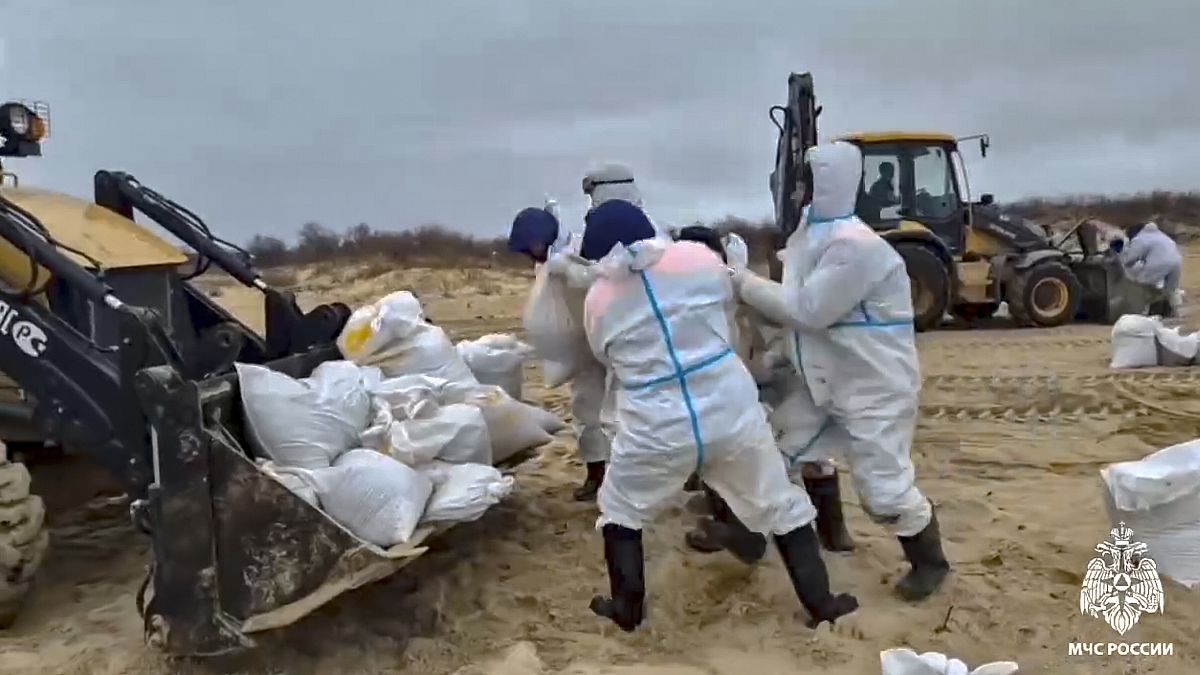The Kerch Strait oil spill incident that occurred nearly three weeks ago has resulted in the deaths of at least 32 dolphins, with a total of 61 dead cetaceans recorded since the disaster. An animal rescue group, Russia’s Delfa Dolphin Rescue and Research Centre, has attributed these deaths to the fuel oil spill. The majority of the deceased dolphins belonged to the endangered Azov species, and their bodies have been washing up on the shores of the Crimean Peninsula and Russia’s southern Krasnodar region. The spill has prompted authorities in these regions to declare emergencies, with significant cleanup efforts underway to address the environmental impact of this incident.
Officials in Crimea and Krasnodar have declared regional emergencies after oil was discovered on several beaches along the coastlines. The spill originated from two tankers in the Kerch Strait and has led to the contamination of sand, soil, and water in the affected areas. Nearly 7,000 individuals are working to clean up the spill, with over 96,000 tons of contaminated materials already removed from the shoreline. The broader impact of the spill is estimated to be significant, with up to 200,000 tons of mazut oil product potentially contaminating the environment. Russian President Vladimir Putin has labeled the oil spill as an “ecological disaster,” underscoring the severity of the situation.
The Kerch Strait, a critical shipping route that connects the Sea of Azov to the Black Sea, has been a contentious area following Russia’s annexation of the Crimean Peninsula in 2014. The ongoing conflict between Russia and Ukraine over control of the strait has added political and security dimensions to the environmental repercussions of the oil spill. Ukraine has raised concerns about the spill as a large-scale environmental disaster and has called for sanctions on Russian tankers as a means of addressing the issue. The spill has highlighted the interconnected nature of environmental, political, and security challenges in the region, underscoring the need for comprehensive responses to address such incidents.
The impact of the oil spill on marine life, particularly dolphins and whales, underscores the vulnerability of aquatic ecosystems to human activities. The deaths of these cetaceans highlight the devastating consequences of environmental disasters on wildlife populations and the delicate balance of marine ecosystems. Efforts to mitigate the environmental damage caused by the spill are essential to safeguarding the health and well-being of marine species in the affected areas. The response to the spill, including cleanup operations and the implementation of environmental safeguards, will be crucial in determining the long-term impact on the region’s biodiversity and ecosystem health.
The declaration of regional emergencies in Crimea and Krasnodar reflects the urgency of addressing the oil spill and its environmental consequences. The coordination of cleanup efforts involving local authorities, volunteers, and government agencies is essential to effectively manage the aftermath of the disaster. The removal of contaminated materials, restoration of affected habitats, and monitoring of environmental impacts will be key components of the response to the spill. Additionally, public awareness campaigns and community engagement efforts can help raise awareness about the importance of environmental conservation and the need for sustainable practices to prevent similar incidents in the future.
In conclusion, the Kerch Strait oil spill has had significant environmental, economic, and political ramifications, underscoring the complex challenges associated with managing environmental disasters in sensitive ecosystems. The deaths of marine mammals such as dolphins serve as a stark reminder of the fragile nature of marine habitats and the importance of protecting biodiversity. The response to the spill will require a multi-faceted approach that addresses the immediate cleanup needs while also focusing on long-term environmental restoration and conservation efforts. By working together to address the impact of the oil spill, stakeholders in Crimea, Krasnodar, and beyond can contribute to the preservation of marine ecosystems and the protection of wildlife in the region.









